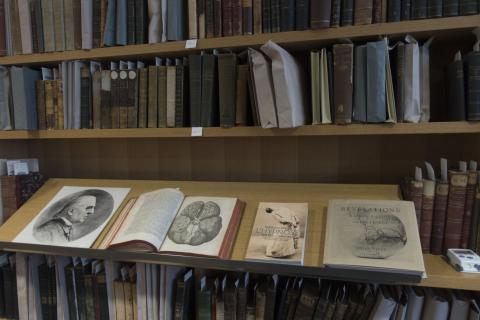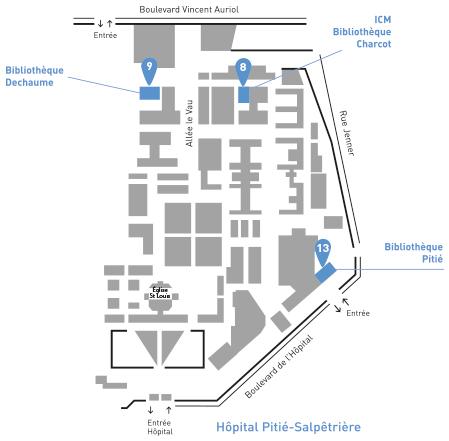
The Charcot library
The Charcot library, specialized in neuroscience, houses a historical collection consisting mainly of Jean-Martin Charcot's personal library, supplemented by the Salpêtrière Interns' library.
Location : Institut du Cerveau et de la Moelle épinière (ICM), 47 boulevard de l’Hôpital, 75013 Paris.
Opening hours : Monday to Friday from 1:30 to 5:30 p.m.

The reading room and library are open to all Sorbonne Université and ICM staff, researchers, lecturers, professors and students, as well as to anyone carrying out research on the library's collections (proof of research may be requested).
You must register at the library before consulting any documents.
All documents held in the Charcot library can only be consulted on site, subject to their state of preservation. Some of the Charcot library's documents can be accessed digitally.
Requests for documents can be made by telephone or e-mail before the researcher arrives.
For documents not in the reading room, access will be delayed by half a day. Requests made in the morning will be answered in the afternoon. Requests made in the afternoon will be answered the following morning.
The library holds 76 journal titles and 7,300 titles, divided between the reading room (4,700) and the store (2,600).
- Fonds historique Charcot (J-M. Charcot's personal library): books, periodicals, collection of theses and offprints, manuscripts, neurological collection covering the second half of the 19th century, old bibliophilic collection.
- The Salpêtrière Intern's library: books, periodicals, theses in neurology and psychiatry from 1800-1950.
- Donations of works by Doctor Achille Souques
Comprising some 3,500 volumes, the Souques donation included :
- Medical and neurological works published between 1850 and 1893, including several annotated by Charcot. These included the famous "Iconographie Photographique de la Salpêtrière", containing observations of hysterical patients and accompanied by numerous photographs illustrating the different stages of hysteria as differentiated by Charcot.
- Important collections of journals. In addition to French medical literature (Archives de neurologie, Progrès Médical...), Charcot collected, read and listed English, American and even German titles, such as Rudolf Virchow's Archiv für Pathologische Anatomie und Physiologie und für klinische Medicin - who, along with Pasteur and Charcot, was the emblem for the Third Republic of progressive, politically aware medicine.
- A collection of compilations of "tirés-à-part", consisting of articles that Charcot received in tribute from his correspondents around the world, each with a dedication (two articles dedicated by Freud, for example).
- collections of theses written by Charcot's pupils or sent by his correspondents, on subjects such as neurology, psychiatry, hysteria and multiple sclerosis.
- Manuscripts of Charcot's lectures on rheumatism, diseases of the nervous system and diseases of the elderly (available in digital format).
40 files of observations on outpatients. Each observation consists of a description of the case, accompanied by sketches, newspaper clippings, even photographs, and Charcot's own comments, a precious collection for anyone wishing to study the working methods of a 19th-century scientist. - A bibliophile's collection (16th - 18th century) compiled by Charcot: an honest man's library, including numerous atlases of the nervous system, works by Vicq d'Azyr and Cruveilhier's Anatomie (some atlases and treatises available in digital format).
Digital collection
Consisting mainly of J.M. Charcot's personal library, part of this collection has been scanned, with a view to preserving original documents and promoting collections with a notable iconographic character.
The digitized works are accessible via the digital library SorbonNum.
